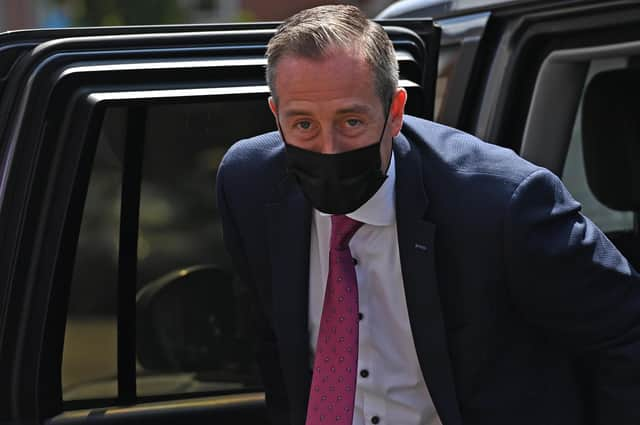NI Protocol: First Minister warned he cannot hide behind joint office in north-south meetings boycott case


Due to arrangements within the Executive Office at Stormont, Mr Givan and Junior Minister Gary Middleton are unrepresented in a challenge to their party’s withdrawal from the cross-border conferences.
Mr Justice Scoffield was told they don’t “exist” as individuals with legal status and are unable to participate without consent of the Deputy First Minister.
Advertisement
Hide AdAdvertisement
Hide AdBut the judge insisted the court’s supervisory function should not be nullified by how the power-sharing administration operates.
He said: “The First Minister, or the Deputy First Minister, cannot be entitled to hide behind the joint nature of the office to not participate in proceedings, avoid any duty of candour which arises, and then say the court cannot make any order.”
“I don’t think it can be right that (the holders) of each of those offices can insulate themselves from any legal challenge by simply raising the shield of the joint nature of the office.”
Judicial concerns were expressed at a review hearing in the ongoing legal action against DUP representatives for snubbing North South Ministerial Council (NSMC) meetings.
Advertisement
Hide AdAdvertisement
Hide AdThe party has vowed to disengage from the events as part of its opposition to the Northern Ireland Protocol.
Belfast businessman Sean Napier brought proceedings against Mr Givan, Mr Middleton, Economy Minister Gordon Lyons, Education Minister Michelle McIlveen, and Agriculture Minister Edwin Poots.
Last month the judge declared that the party’s withdrawal is an unlawful breach of the pledge of office.
Despite the ruling, there appears to have been no change to the DUP’s position.
Advertisement
Hide AdAdvertisement
Hide AdUnder Stormont rules, both a unionist and a nationalist minister must participate.
Lawyers for Mr Napier are expected to seek an order of mandamus compelling the DUP to attend NSMC meetings.
At a review today the court heard distinctions are being drawn between scheduled and proposed meetings.
Correspondence provided by the Departmental Solicitor’s Office included a series of memos in which Sinn Fein Deputy First Minister Michelle O’Neill expressed “dissatisfaction” with the ongoing failure to identify a unionist minister to attend NSMC events.
Advertisement
Hide AdAdvertisement
Hide AdMr Napier’s barrister, Ronan Lavery QC, advanced arguments that obligations exist to schedule meetings and comply with the legislation.
“You cannot simply frustrate it by not scheduling,” he said.
Tony McGleenan QC, for the three represented DUP Ministers, set out why Mr Givan and Mr Middleton were unable to participate.
“They cannot act unilaterally, it will require authorisation of the Office,” he submitted.
Advertisement
Hide AdAdvertisement
Hide Ad“They are respondents as joint holders of an office, they don’t exist as individuals in terms of legal status.”
According to counsel, securing separate legal representation would mean instructing lawyers for both the First Minister and Deputy First Minister - making it more difficult to reach a resolution.
“What it will serve to do is heighten the temperature of a case (and cause) a plethora of other problems,” Mr McGleenan argued.
During exchanges Mr Justice Scoffield stressed the need to ensure fairness to both Mr Givan and Mr Middleton.
Advertisement
Hide AdAdvertisement
Hide Ad“I don’t want to raise the temperature of the proceedings or make them more complicated or costly for anyone,” he added.
However, he set out his view that only some of the relevant information had been provided.
“It seems to me that’s pretty unsatisfactory.”
A hearing to determine any further orders has been listed for November 16.
Outside court Mr Napier’s solicitor, Paul Farrell of McIvor Farrell, claimed the DUP Ministers were in breach of the judicial declaration.
Advertisement
Hide AdAdvertisement
Hide AdHe said: “What began as a political stunt has now developed into a focused analysis into the obligations of the First Minister and Deputy First Minister, both to each other and their joint office responsibilities.